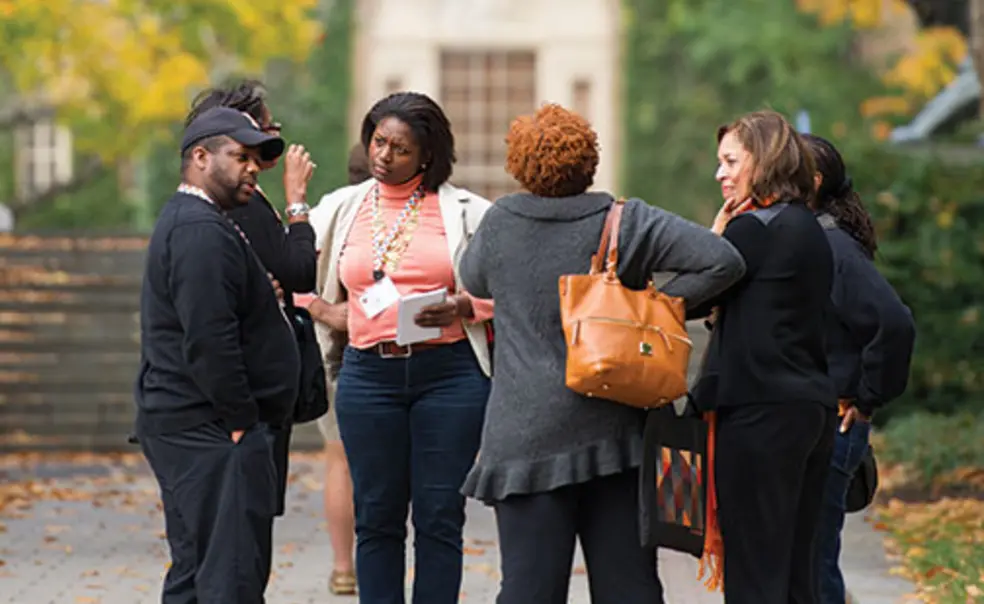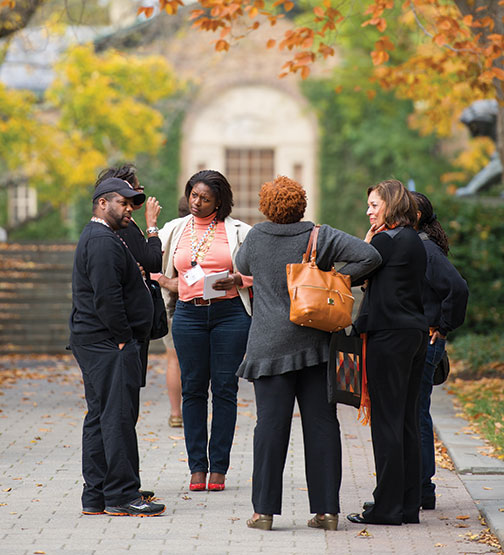Coming Back: Black Alumni connect at third conference
David L. Evans *66 was born to sharecropper parents in Arkansas who had six years of education between them. Evans’ parents had died by the time he was 16, but he and his six siblings all attended college, and three earned advanced degrees. Returning for the University’s third conference for black alumni, Evans reflected on his arrival at Princeton, 50 years ago this fall, to study electrical engineering: “This campus, like all the others — if it was a condiments table, there was salt and a very small shaker of black pepper. Today, there’s salt, pepper of many flavors, cinnamon, saffron, and fascinating combinations thereon.”
Evans joined about 750 alumni and guests on campus Oct. 16–18 to reunite with classmates, learn about today’s Princeton, and attend forums on issues ranging from the Civil Rights Act to black political power in the post-Obama era. “Coming Back: Reconnecting Princeton’s Black Alumni” was the third conference for African American alumni since 2006, and had the largest turnout of the three. Those attending represented classes from 1962 to 2014 and traveled from more than 30 states and six countries. Speakers included CEO of Ariel Investments John Rogers ’80 and ESPN analyst Craig Robinson ’83, the brother of first lady Michelle Obama ’85.
“I think it’s important to have a space to connect across generations and discuss the strength that lies within our community,” said Adetola Olatunji ’11, who came to the event from Massachusetts, where she works at a nonprofit strategy and research organization.
The conference reflected on both national topics and issues of diversity at Princeton. During one session, administrators detailed the University’s efforts to make Princeton more welcoming to a diverse range of students and faculty. A panel on the student experience featured graduate and undergraduate students who discussed how race still affects interactions on Prospect Avenue and in the classroom. Brandon Holt ’15 spoke about the challenges of being the only African American student in a precept.
“It’s in those classes where you’re the only black person, where you’re suddenly the voice of the entire black community,” he said. “People kind of turn and look to you ... and that pressure to always be the voice of something is overwhelming.”
A highlight of the event was an interview with novelist and Nobel laureate Toni Morrison, who was a member of the faculty for 17 years before retiring in 2006. The University recently purchased her papers, which include correspondence, diaries, and photographs, as well as manuscripts, drafts, and proofs of her novels, such as Beloved, Song of Solomon, and The Bluest Eye. President Eisgruber ’83 announced at the conference that Morrison’s papers — more than 180 linear feet of research materials — now are part of the library’s collections.
Eisgruber, in his welcoming remarks, said, “The University’s leadership is more diverse and multicultural than ever,” citing African American and other minority administrators who fill cabinet-level positions at Princeton. “On the one hand, I’m proud of where the University has been going since the last [‘Coming Back’] conference, but I know we have a lot of work left to do.”
For Kim Boyle ’84, who traveled from New Orleans, the conference was a chance to consider how Princeton has changed since she attended. “The level of diversity and inclusion you have now was not there back then,” she said. “To see all of us come back and be able to celebrate what was great about school, and talk about and reflect on maybe what was not so great, was just a phenomenal experience.”













No responses yet